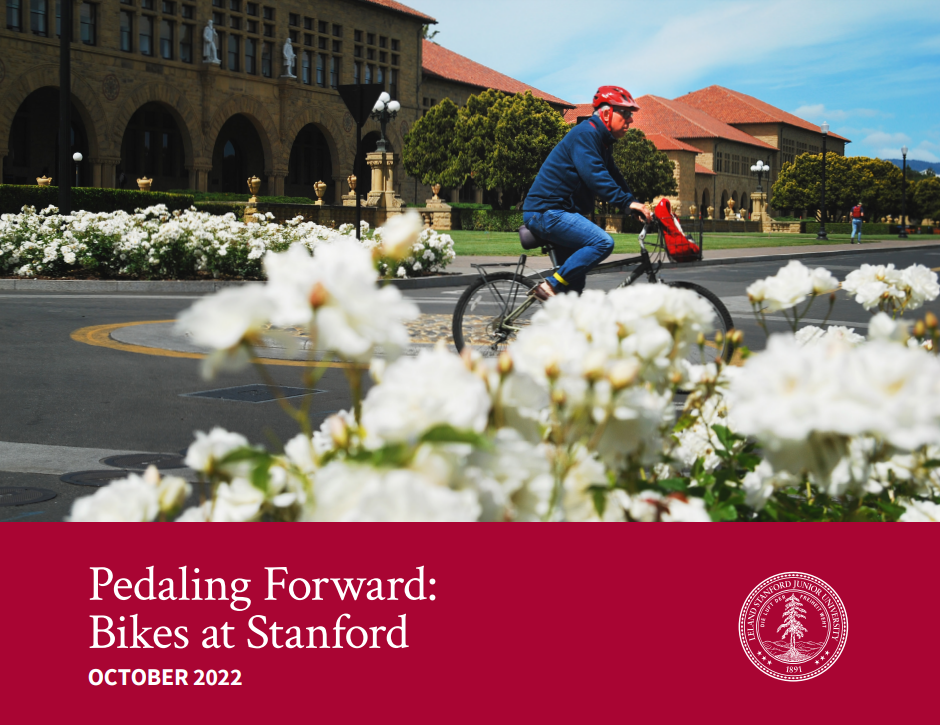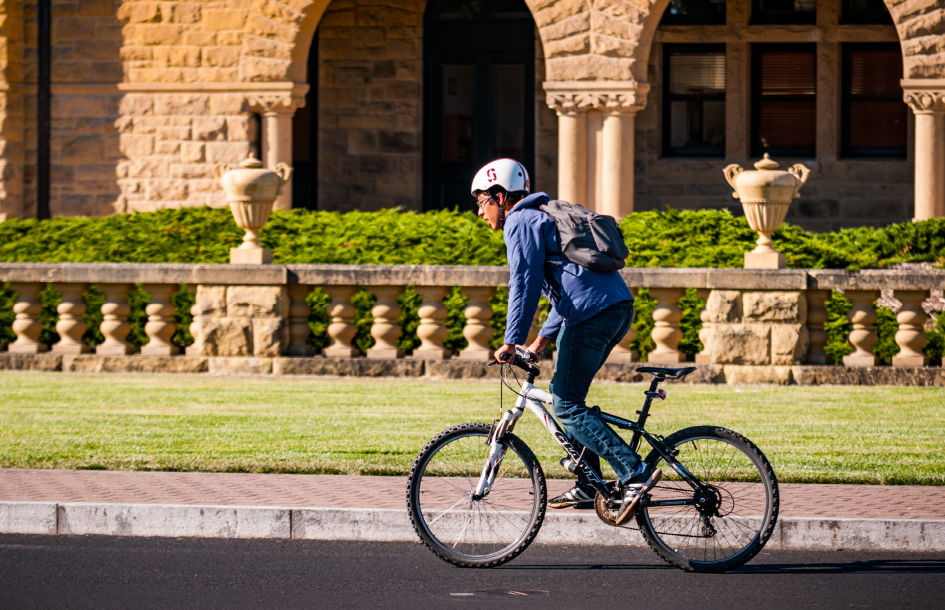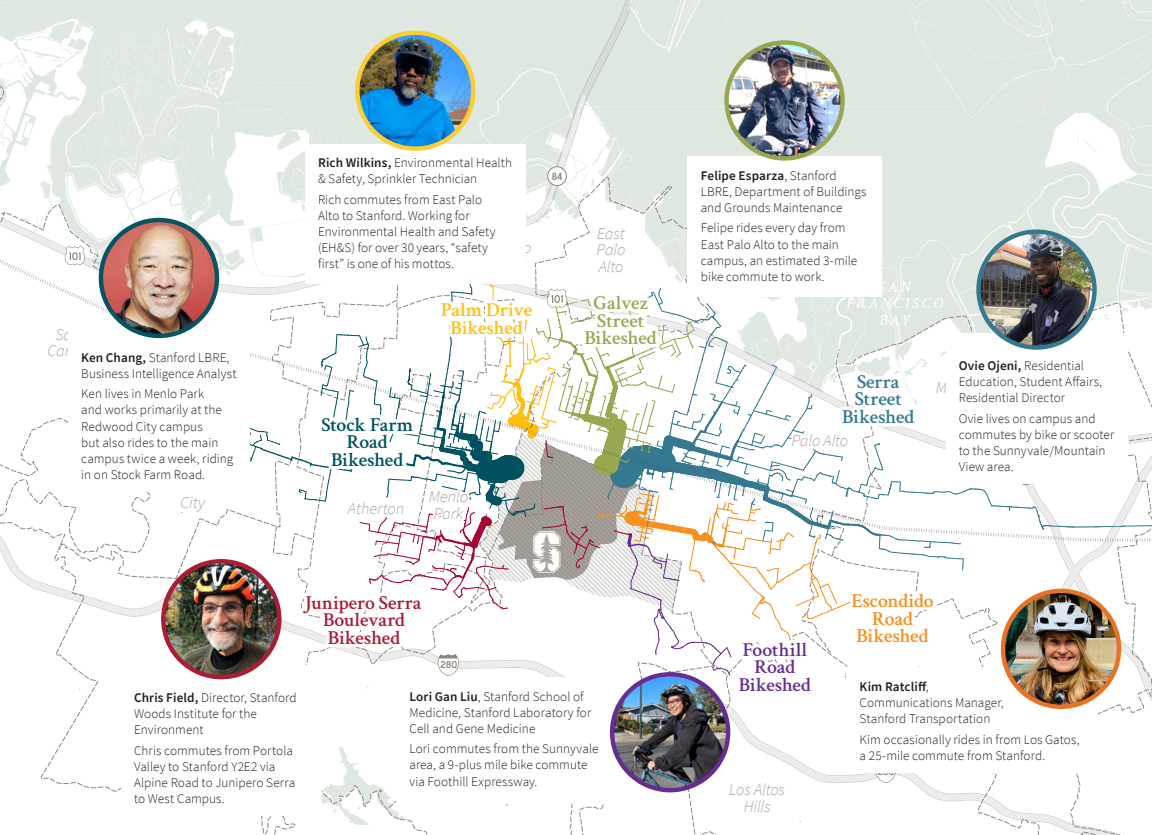[Published: November 16, 2022; updated October 26, 2023]
Land Use & Environmental Planning, working with Stanford Transportation, recently produced a report on biking at Stanford. The report includes a profile of the Stanford campus, as well as profiles of Stanford Medicine, the Stanford Redwood City campus, and Stanford Research Park. Titled Pedaling Forward, it focuses on four areas: Sustainability; Partnerships; Diversity, Equity, and Inclusion; and Highlights from Education, Infrastructure, and Engineering.

The report:
- describes the current trend towards building bikeways for people of all ages and abilities
- examines the opportunities and challenges for current bicycle commuters
- presents projects in neighboring communities that will increase the number of bike commuters at both Stanford and nearby communities
A key finding of the report is the importance of Diversity, Equity, and Inclusion (DEI) initiatives. Findings indicate Stanford needs to direct attention and resources to DEI in order to ensure all campus community members have broad access to the same opportunities and benefits, including sustainable commute choices like bicycling.
Additional findings
 Pedaling Forward shows that Stanford's bike mode share is resilient because of the university’s commitment to active transportation education and engineering while highlighting the need to improve access for its diverse population. The pandemic, along with Stanford’s equity and inclusion initiatives, has brought awareness that imbalances exist. The report concludes it’s imperative that an easy, safe, and direct biking experience is accessible to Stanford’s diverse population – regardless of geographical area, income level, ethnicity, or skill level.
Pedaling Forward shows that Stanford's bike mode share is resilient because of the university’s commitment to active transportation education and engineering while highlighting the need to improve access for its diverse population. The pandemic, along with Stanford’s equity and inclusion initiatives, has brought awareness that imbalances exist. The report concludes it’s imperative that an easy, safe, and direct biking experience is accessible to Stanford’s diverse population – regardless of geographical area, income level, ethnicity, or skill level.
Providing outreach and support to underserved community members will be a top priority. “In order to continue the success of the TDM program and continue to be the leader in bike commute mode share, we need to ensure that diversity and inclusion are reflected in our work,” said Brian Shaw, Executive Director of Stanford Transportation.
How will Stanford attain these goals?

Stanford is committed to its continued mission of building internal and external partnerships to help improve the safety and comfort of bicyclists. These efforts toward safer streets will stretch beyond campus and require collaboration with partners across agencies, boundaries, and jurisdictions.
Additionally, Stanford will prioritize student, faculty, and staff outreach to better understand barriers to bicycling. Providing education on existing programs that offer free bike safety information, registration, and assistance with routes to and from the campus can help unlock a more diverse and inclusive bicycle community across Stanford.
Among recent program highlights:
- Implemented a separated bike lane pilot on Santa Teresa to provide safety for motorists and bicyclists navigating a main entry into the campus.
- Utilized Transportation Survey data to understand demographic trends in bicycle commuting and identify areas of focus to ensure that all people have access to safe bicycling.
- Launched a campus-wide “Share the Road” training webinar to ensure all roadway users display mutual respect when sharing campus road- and pathways.
- Expanded bike parking on campus including two new bike cages (one in planning stages) on the Stanford campus.
The Five E’s for a Bicycle Friendly America Program
Stanford was the first university to be recognized by the League of American Bicyclists’ (LAB) at the highest platinum level in 2011. In the years since, Stanford is the only university to receive four consecutive Platinum designations, of which the last extends through 2027. The purpose of Pedaling Forward is to help keep Stanford at the forefront as a forward-thinking leader and ensure the continuation of a resilient bicycle program.
LAB’s Bicycle Friendly America program is built around five categories — the Five E's — that are consistent in making great places for bicycling. These categories are Engineering, Education, Encouragement, Evaluation & Planning, and Equity & Accessibility. Following LAB’s lead, Stanford permanently removed Enforcement as one of the E’s.
For more information, please contact Ariadne Delon Scott, Stanford Transportation Assistant Director of Active Mobility at adscott@stanford.edu.

